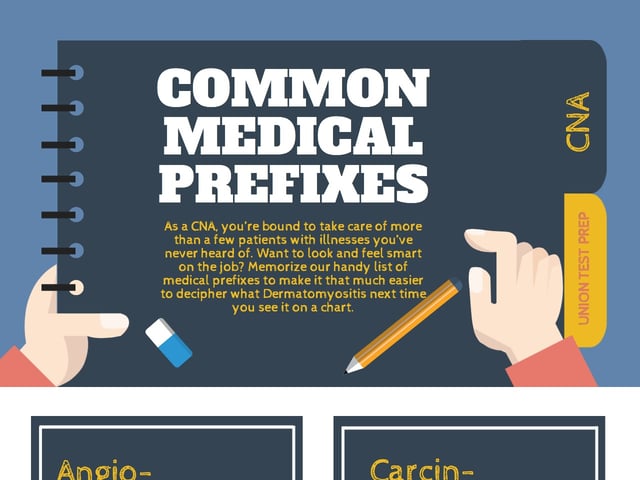
Common Medical Prefixes
As a Certified Nursing Assistant (CNA), you play an essential role in patient care. Understanding medical terminology is crucial for your day-to-day responsibilities, which often involve communicating with nurses, physicians, and patients. This blog post will focus on common medical prefixes, equipping you with the foundational knowledge to navigate the vast medical vocabulary.
The Importance of Medical Prefixes
In the realm of healthcare, communication needs to be precise and quick. Understanding the language of medicine – particularly the prefixes that form the building blocks of medical terminology – is a vital skill that can significantly improve both these aspects. But before we delve into the specifics, let’s begin with a clearer understanding of what a medical prefix is and why it’s so important.
A medical prefix is a group of letters added at the beginning of a root word to modify or expand its meaning. Often, this prefix denotes a location, time, number, or status, thereby providing vital context about a medical condition, procedure, or anatomy.
Why Understanding Medical Prefixes is Crucial for CNAs
As a CNA, you are an essential link between patients and their healthcare providers. The language of medicine can often feel like a foreign language, but with knowledge and understanding of medical prefixes, it can become significantly more manageable. Here’s why understanding medical prefixes is so essential:
Improve Patient Care
An understanding of medical prefixes directly contributes to enhancing patient care. When you understand medical terminology, you are better equipped to interpret physicians’ instructions, the nature of patients’ diagnoses, and the appropriate care or procedure required.
For example, if a patient has tachycardia, knowing that tachy- denotes fast can help you understand the patient’s condition (a fast heart rate) better. This knowledge can inform how you monitor and care for the patient, such as ensuring they are at rest and reporting any distressing symptoms promptly.
Facilitate Communication with Healthcare Professionals
Effective communication is the cornerstone of any healthcare setting, and the ability to comprehend and utilize medical terminology is key to this. With a good understanding of medical prefixes, you can interpret and relay information more efficiently.
For instance, if a nurse asks you to monitor a patient’s hypotension, knowing that hypo- means below or under can quickly inform you that the patient’s blood pressure may be lower than usual. You’ll be able to carry out your task more effectively, knowing what to look out for and when to raise a concern.
Enhance Your Ability to Document Patient Information
Documenting patient information accurately is an integral part of a CNA’s role. Medical documentation needs to be precise, clear, and concise, as it’s a critical communication tool that allows healthcare professionals to understand a patient’s health status, the care provided, and plan future care.
Understanding medical prefixes can significantly improve the accuracy of your documentation. For example, when documenting a skin examination, knowing that epi- means upon or over can help you correctly understand and note down observations about a patient’s epidermis or the outermost layer of skin.
Common Medical Prefixes
The following section presents a comprehensive table of common medical prefixes. Each entry includes the prefix, its meaning, an example word that uses the prefix, and an explanation of the example word’s meaning. By familiarizing yourself with these prefixes, you will be better equipped to comprehend and communicate complex medical information, leading to more efficient and effective patient care.
| Prefix | Meaning | Example | Explanation |
|---|---|---|---|
| A-, An- | Without, lack of | Aseptic | Without infection |
| Ab- | Away from | Abduction | Moving a body part away from the midline of the body |
| Ad- | Toward, increase | Adduction | Moving a body part toward the midline of the body |
| Anti- | Against | Antibiotic | Against life (microorganisms) |
| Bi- | Two | Bifocal | Two focuses |
| Brady- | Slow | Bradycardia | Slow heart rate |
| Dys- | Difficult, painful, bad | Dyspnea | Difficulty breathing |
| Epi- | Upon, over | Epidermis | Upon the skin |
| Hyper- | Excessive, above | Hypertension | High blood pressure |
| Hypo- | Deficient, below | Hypotension | Low blood pressure |
| Inter- | Between | Interstitial | Between cells |
| Intra- | Within | Intravenous | Within a vein |
| Macro- | Large | Macrocyte | Large cell |
| Micro- | Small | Microcyte | Small cell |
| Neo- | New | Neoplasm | New growth (tumor) |
| Poly- | Many, much | Polycythemia | Many cells in the blood |
| Post- | After | Postoperative | After surgery |
| Pre- | Before | Prenatal | Before birth |
| Tachy- | Fast | Tachycardia | Fast heart rate |
| Uni- | One | Unilateral | One side |
| Sub- | Under, below | Subcutaneous | Under the skin |
| Super-, Supra- | Above, beyond | Suprarenal | Above the kidneys |
| Tri- | Three | Tricuspid | Having three cusps |
| Quad- | Four | Quadriceps | A four-headed muscle |
| Penta- | Five | Pentasaccharide | Composed of five sugars |
| Hemi- | Half | Hemiplegia | Paralysis of one side of the body |
| Multi- | Many | Multifocal | Having many focal points |
| Nulli- | None | Nullipara | A woman who has never given birth |
| Oligo- | Few, little | Oliguria | Small production of urine |
CNAs: Essential to the Healthcare Profession!
As we wrap up this exploration of common medical prefixes, it’s important to remember that this is just the tip of the iceberg in the vast world of medical terminology. However, these prefixes are some of the most frequently used and can form a solid foundation for you as a CNA.
Understanding and remembering all these medical prefixes may seem overwhelming at first, but consistent practice and usage can significantly improve your fluency. Integrating these terms into your day-to-day activities, discussions, and notes will not only help you remember them better but will also improve your communication with other healthcare professionals and your care for patients.
A practical way to reinforce your knowledge is by regularly testing yourself. Consider using CNA practice tests or flashcards as study tools. These methods can provide a fun and interactive way to check your understanding and recall of these prefixes.
Remember, as a CNA, your dedication to learning and improving is what sets you apart. Your efforts in understanding medical prefixes and other medical terminologies will pay off in your professional growth, enhanced patient care, and overall career satisfaction. Thank you for being the backbone of healthcare. Keep learning, and keep growing!
Keep Reading

Certified Nursing Assistant Exam Blog
How Long Does it Take to Become a CNA?
As a profession on the frontline of healthcare, Certified Nursing Assis…

Certified Nursing Assistant Exam Blog
How to Do Well on the CNA Skills Test
Over 1.3 million nursing assistants work in our healthcare system today…

Certified Nursing Assistant Exam Blog
What Does a Nursing Assistant (CNA) Do?
Are you interested in exploring medical careers? The healthcare industr…